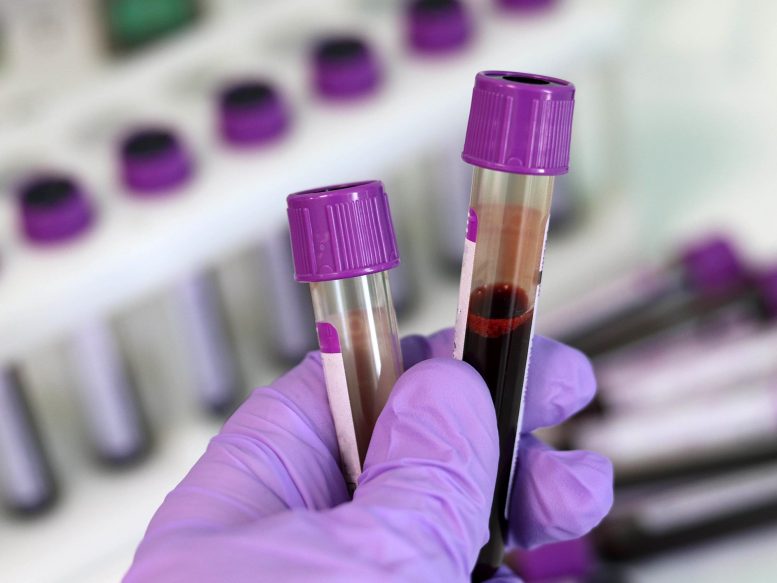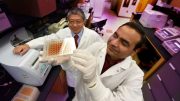
A large study led by Lund University in Sweden has identified a protein in the blood that could predict type 2 diabetes up to nineteen years before the onset of the disease. The study is published in Nature Communications.
Type 2 diabetes is a growing global epidemic, with 6% of the world population suffering from the disease. However, the risk of developing type 2 diabetes can be greatly reduced by weight control, eating well and exercising before the actual manifestation of the disease. Early detection of type 2 diabetes risk before symptoms could help minimize health complications related to diabetes.
“We found that higher levels of the protein follistatin circulating in the blood predict type 2 diabetes up to nineteen years before the onset of the disease, regardless of other known risk factors, such as age, body mass index (BMI), fasting blood glucose levels, diet or physical activity,” says Dr. Yang De Marinis, associate professor at Lund University and lead author of the study.
This discovery is based on studies that followed 5,318 people over the course of 4 to 19 years in two different locations in Sweden and Finland.
Follistatin is a protein that is mainly secreted from the liver and involved in the regulation of metabolism. The study investigated what happens to the body when follistatin in the blood circulation becomes too high. Using clinical data from the German Tübingen Diabetes Family Study and cell biology investigation, the researchers found that follistatin promotes fat breakdown from the adipose tissue, resulting in increased lipid accumulation in the liver. This in turn increases the risk of nonalcoholic fatty liver disease and type 2 diabetes.
To find out what regulates blood follistatin levels, the researchers performed genome-wide association study (GWAS) on 5,124 people from Sweden, the UK and Italy, and revealed that follistatin levels are genetically regulated by glucokinase regulatory protein (GCKR), which impact on several metabolic traits.
“This study shows that follistatin has the potential to become an important biomarker to predict future type 2 diabetes, and it also brings us one step closer to the understanding of the mechanisms behind the disease,” says Yang De Marinis.
The next step is to put the results into clinical use. An AI-based diagnostic tool using follistatin as a biomarker for type 2 diabetes is being developed through the biotech startup Lundoch Diagnostics, where Yang De Marinis is CEO. This will commercialize the tool under patent applications in global markets. The tool aims to provide a simple blood test, where results from a protein biomarker panel can be imputed in an AI-driven algorithm, and ultimately give patients a risk score to assess their risk of future type 2 diabetes.
“This discovery holds the opportunity of instituting measures to prevent type 2 diabetes from becoming established. Our research will continue towards this goal,” concludes Yang De Marinis.
Reference: “Elevated circulating follistatin associates with an increased risk of type 2 diabetes” by Chuanyan Wu, Yan Borné, Rui Gao, Maykel López Rodriguez, William C. Roell, Jonathan M. Wilson, Ajit Regmi, Cheng Luan, Dina Mansour Aly, Andreas Peter, Jürgen Machann, Harald Staiger, Andreas Fritsche, Andreas L. Birkenfeld, Rongya Tao, Robert Wagner, Mickaël Canouil, Mun-Gwan Hong, Jochen M. Schwenk, Emma Ahlqvist, Minna U. Kaikkonen, Peter Nilsson, Angela C. Shore, Faisel Khan, Andrea Natali, Olle Melander, Marju Orho-Melander, Jan Nilsson, Hans-Ulrich Häring, Erik Renström, Claes B. Wollheim, Gunnar Engström, Jianping Weng, Ewan R. Pearson, Paul W. Franks, Morris F. White, Kevin L. Duffin, Allan Arthur Vaag, Markku Laakso, Norbert Stefan, Leif Groop and Yang De Marinis, 10 November 2021, Nature Communications.
DOI: 10.1038/s41467-021-26536-w









Be the first to comment on "Biomarker Discovered That Predicts Type 2 Diabetes Many Years Before Diagnosis"